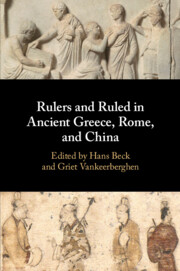Book contents
- Rulers and Ruled in Ancient Greece, Rome, and China
- Rulers and Ruled in Ancient Greece, Rome, and China
- Copyright page
- Contents
- Figures
- Tables
- Maps
- Contributors
- Preface
- Chronology of the Ancient Mediterranean
- Chronology of Ancient China
- Maps of Ancient China, Greece, and Rome
- The Many Faces of “the People” in the Ancient World
- Part I Authority and Lifestyles of Distinction
- Part II The People as Agents and Addressees
- Part III Inversions of the People: Emperors and Tyrants
- Part IV Identities and “Others”
- Glossary
- Index
- References
The Many Faces of “the People” in the Ancient World
δῆμος – populus – 民 min
Published online by Cambridge University Press: 19 January 2021
- Rulers and Ruled in Ancient Greece, Rome, and China
- Rulers and Ruled in Ancient Greece, Rome, and China
- Copyright page
- Contents
- Figures
- Tables
- Maps
- Contributors
- Preface
- Chronology of the Ancient Mediterranean
- Chronology of Ancient China
- Maps of Ancient China, Greece, and Rome
- The Many Faces of “the People” in the Ancient World
- Part I Authority and Lifestyles of Distinction
- Part II The People as Agents and Addressees
- Part III Inversions of the People: Emperors and Tyrants
- Part IV Identities and “Others”
- Glossary
- Index
- References
Summary
Few words in the historian’s vocabulary have such a wide semantic gulf as “the people.” Add to this the vast range of different languages, cultures, and layers of time in which “the people” are invoked, and the term translates into a commonplace. The present volume reclaims some of the conceptual capacity of “the people” in history. It looks at the ancient worlds of Greece, Rome, and China through the lens of cross-cultural comparison, addressing some of the key issues that related to the notion of “the people” in the variant of each civilization. In this vein of inquiry, the book raises a set of questions: the positional question of who “the people” were, also in relation to other people; the participatory question of how groups of “the people” constituted themselves through patterns of belonging and exclusion, and how their status, or nonstatus, was charged with meaning; and the conversational question of how “the people” communicated about their group cohesion and negotiated the omnipresence of imbalances in, for instance, gender, social status, political entitlement, economic ability, or cultural expertise.
- Type
- Chapter
- Information
- Rulers and Ruled in Ancient Greece, Rome, and China , pp. 1 - 22Publisher: Cambridge University PressPrint publication year: 2021
References
- 1
- Cited by



